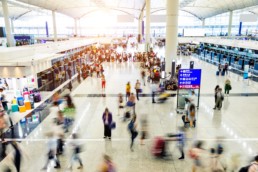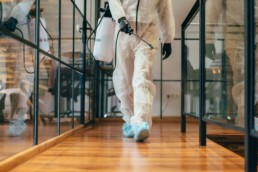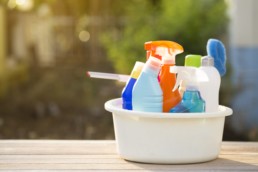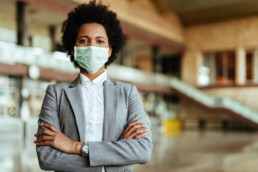Article originally published in July 21, 2020.
“It took twelve years for us to build, and we lost almost everything in six weeks”. These were the words of Brian Chesky, CEO of hospitality giant, Airbnb, when he was recently interviewed by CNBC and asked about the effects of the COVID-19 pandemic on the company he leads.
Although there is not a single industry that has been left unscathed by the effects of the coronavirus crisis spreading across the globe, no businesses have been as affected as those in the hospitality industry, which depend entirely on the movement of people to survive. The widespread cancellation of flights, closure of borders, lockdown measures, and a general sense of distrust and apprehension have all but decimated a market that was so healthy only months before the pandemic began.
Unfortunately, numerous airlines have declared bankruptcy, and many hotels are preparing to repurpose their spaces for other uses, now that public gatherings and conferences have been canceled indefinitely.
We cannot simply name this a negative trend – it is more of a catastrophic event for the travel industry in general, and not only for the consumers of leisure travel. It is businesses that represent the main clients for companies in hospitality, as they are the most likely to provide recurring revenue and sign lucrative deals with hotels and other service providers.
Yet, as the world reopens and companies seek to recover from the terrible side-effects of COVID-19, a ray of hope begins to shine – the potential for safer conditions in hotel rooms, apartments that are welcoming and clean, and the return of consumer trust towards travel and hospitality. We’re talking about green chemicals, which are rapidly reaching dozens of countries and regions in an attempt to keep guests safer in a new, post-COVID world.
Can green chemistry truly save the hospitality industry?
As of July 2020, despite numerous countries across Europe and the Americas having opened their borders for travelers entering their territories, as well as certain stricter restrictions having been lifted, there is a general feeling of dread surrounding the idea of flying on a plane full of potential virus carriers and staying at a possibly contaminated room or apartment, and this sensation has caused tourists to postpone or abandon their travel plans entirely.
However, in an interesting additional detail, consumers have also expressed that they are willing to travel and stay in a certain hotel room or apartment if it can ensure the correct safety measures and cleaning protocols that will keep them protected against the virus and other pathogens. In fact, according to a survey made by Avvio.com, 21% of their followers on social media still wish to travel in 2020, with 13% of them planning to book later in the year.
This reveals something important that the chemical industry has already begun taking note of: the hospitality industry can and will get past this crisis if the right actions are taken, the sooner the better.
Sanitization is rapidly becoming a top priority, as is the disinfection of surfaces, and this is where green chemistry gains crucial importance: it is one thing to kill deadly pathogens at a hospital or in a lab with potent disinfectants, but the other is to use these same chemical agents in a space full of human beings.
Chemicals used for sanitization and disinfection must have mild effects on human health (if any), and they must fulfill all regulatory requirements that are expected of them, especially if they are to be used on surfaces that will be touched by travelers in airports, bedrooms, bathrooms, and planes.
It is for this precise reason that green chemistry is the overall best solution against hospitality, and why we can answer the initial question positively: yes, green chemistry can certainly save the hospitality industry.
But how will this take place? And what type of chemicals and materials will be used to protect travelers?
The chemicals and materials battling against coronavirus
Although the battle against coronavirus has been raging at hospitals and clinics, with medical staff having spent the last months throwing all that they’ve been able to muster at the disease and fighting to keep patients alive, it has actually been outside these spaces where the biggest fight has taken place.
Any doctor or researcher will have no problem admitting it – our most important struggle against the pandemic has been keeping people safe from infection, not curing a patient who is already sick. For this reason, the act of preventing the virus from spreading has been a gargantuan effort. Sanitization (reducing the number of pathogens) and disinfection (killing pathogens) have been key, and the production of antimicrobial agents has reached a level never before seen in the chemical industry.
As mentioned earlier, green chemistry has been applied in a specialized way: by making use of non-toxic, bio-based alcohols and quaternary ammonium compounds, among others, manufacturing companies such as Environmental Fluids have worked hand in hand with billion-dollar hygiene and sanitization consultants to help them reach out to airports, hotels, municipalities, hospitals, and more, making use of these molecules to destroy dangerous pathogens.
But the manufacturing efforts applied to battle the pandemic have not been reduced to antimicrobials alone – important materials and technologies have been created in these challenging times, such as advanced backpack sprayers with built-in ion batteries (for longer operational times); cleaning machines with built-in sprayers for an all-in-one solution to floor scrubbing and disinfection; and heated filters which were able to kill up to 99.8% of the airborne virus which passed through it.
Airports, hotels, and other hospitality companies are already investing heavily in both the chemicals and technologies that are eliminating COVID-19 from vulnerable public spaces.
In a time of struggle and hardship, human ingenuity is thriving to solve problems and save lives, and there is already hope growing steadily for a safer world, in which domestic and international travel will once again be the normality, and where the hospitality industry will once again be booming.
Why green chemicals are the best type of chemicals for the job
Lastly, we must ask ourselves why green chemistry is important in this new environment – what does it mean for these compounds and molecules to be green, and who decides this?
In a world where governmental regulations have become stricter and more necessary than ever, it must be made clear that green chemicals allow for a safer state of mind and guaranteed protection of health. All of these chemicals must pass the following EPA toxicity and health effect tests to be considered green:
- Incidental Oral
- Short-Term Dermal
- Short-and-Intermediate-Term Inhalation
- Carcinogenicity
- Mutagenicity
- Endocrine Disruption Potential
- Dietary Exposure Assumptions
- Dietary Risk from Drinking Water
In this sense, we are talking of chemicals that simultaneously disinfect (kill) or sanitize (reduce the number of) pathogens and cause no serious side effects to humans.
It is the perfect solution for the hospitality industry and the travel industry in general… and it is a reality we are building together.
The plans and strategies created to help the hospitality industry recover from the pandemic have now become active actions and projects, which are already being applied across the world.
With green chemistry and modern technologies, we are building a safer world for those who will soon need to travel across the globe, whether for business or leisure and help humanity achieve normality once more.
If anything, let us use this situation as a lesson: our priority should be human health. Always.





